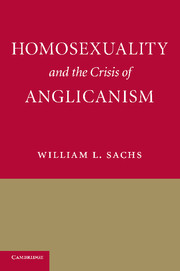Book contents
- Frontmatter
- Contents
- Acknowledgements
- 1 A definitive moment
- 2 The shape of early Christian unity
- 3 When ideals encounter realities
- 4 Reform and the power of the periphery
- 5 Anglican tradition and local prerogative
- 6 The triumph of indigenous Anglicanism
- 7 The rise of Liberalism
- 8 In search of the pure church
- 9 Beyond warring parties?
- Index
- References
3 - When ideals encounter realities
Published online by Cambridge University Press: 05 June 2012
- Frontmatter
- Contents
- Acknowledgements
- 1 A definitive moment
- 2 The shape of early Christian unity
- 3 When ideals encounter realities
- 4 Reform and the power of the periphery
- 5 Anglican tradition and local prerogative
- 6 The triumph of indigenous Anglicanism
- 7 The rise of Liberalism
- 8 In search of the pure church
- 9 Beyond warring parties?
- Index
- References
Summary
IN SEARCH OF TRADITION
The Christian tradition arose unevenly from one place to another, often by disputation and even dissension. It came to be defined from grassroots localities outward with forms of local experience fueling a search for overall consensus. At first there was little sense of church center. As a sense of center arose, religious belief and practice were clearly entwined in cultural garb and buffeted by political and social forces. To be sure, the broad marks of Christian tradition were and are beyond dispute: the New Testament, the centrality of Jesus, the church as the locus of Christian fellowship, and the key roles of worship and ministry. But these central aspects of the Christian faith have continuously been debated as localized variations in meaning and practice have arisen. Two thousand years after its origin, Christianity is characterized by various approaches to tradition reflecting streams of experience that have arisen in differing contexts.
The tradition of the Church of England is hotly contested ground in the Anglican dispute over homosexuality. For traditionalists the Church of England historically has affirmed the essential core of biblical and apostolic belief. In their view, the Church of England not only has upheld key apostolic forms of worship and ministry, it has joined practice with belief in a way that is both faithful and distinctive.
- Type
- Chapter
- Information
- Homosexuality and the Crisis of Anglicanism , pp. 61 - 85Publisher: Cambridge University PressPrint publication year: 2009



